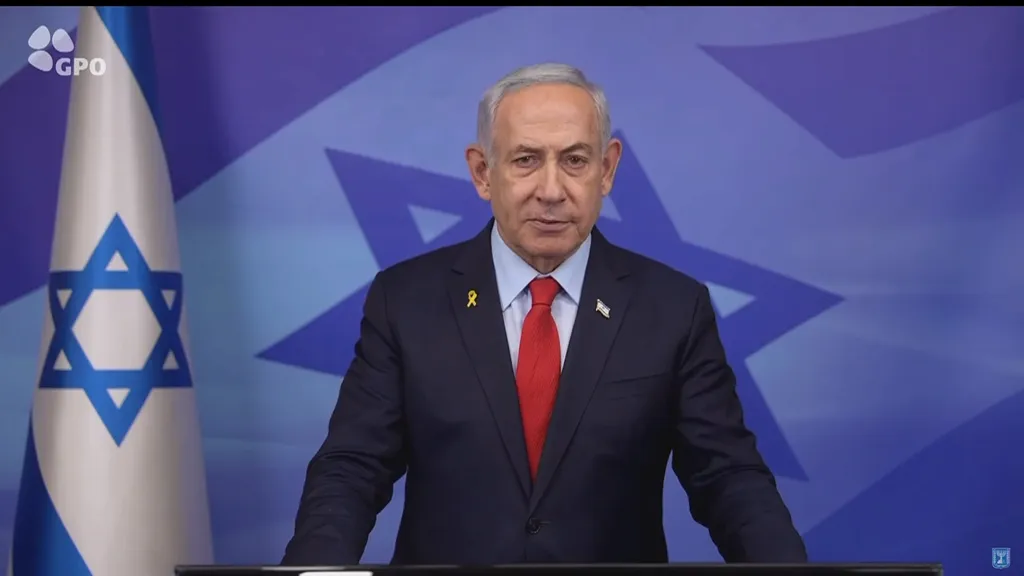
Israeli PM Benjamin Netanyahu
Photo: Screenshot/YouTube
Israel’s PM Benjamin Netanyahu in a televised press conference on Tuesday night announced that he was backing a proposal for a ceasefire with Hezbollah in Lebanon; a proposal that was later approved by his cabinet.
From the available details, under the U.S.-brokered agreement, the Israeli Defense Forces would withdraw from southern Lebanon. In return, Hezbollah and its heavy weaponry would relocate north of the Litani River, itself about 16 miles (25km) north of the Israeli border.
In turn, the Lebanese army would occupy the new border zone—backed by the existing UN peacekeeping force. According to American news site Axios, the agreement includes the establishment of an international committee to monitor its implementation, specifying that the United States would have given assurances of its support for Israeli military action in the event of hostile acts by Hezbollah.
Referring to the war on his northern border—which he called “the seventh front” in an ongoing war—the PM reminded listeners that Hezbollah chose to attack Israel on October 8th of last year.
“It’s been a year,” Netanyahu said. “It’s not the same Hezbollah anymore”:
We’ve pushed Hezbollah decades back. We’ve killed Nasrallah, the head of the snake; we’ve killed all of the leaders; we’ve destroyed most of the rockets and missiles; we’ve killed thousands of terrorists; and we’ve destroyed the underground terrorist infrastructure near our borders that has been built over years.”
Netanyahu said just as he chose to attack Hezbollah in Lebanon “when the time was right,” today, the time was right for bringing a plan for a ceasefire in front of the cabinet.
Lebanon is not the same. Only three months ago, all of this would have sounded like science fiction but it’s not. We made it.
The duration of a potential ceasefire, Netanyahu said, depends completely on what happens in Lebanon.
We have an understanding with the United States; we are maintaining our full liberty to take military operations. If Hezbollah tries to attack us, if it arms itself, if it rebuilds infrastructure next to the borders, we will attack them. If they launch missiles, if they build tunnels, we will attack.”
Following high-level meetings over the weekend, a possible truce was outlined across the Israeli media. The details led some critics to suggest that the proposed settlement would harm the Jewish state far more than its enemies.
Itamar Ben-Gvir, PM Benjamin Netanyahu’s interior security minister, for example, called the discussed ceasefire between Israel and Hezbollah a “grave mistake”:
We have a historic opportunity to decisively act in the south [in Gaza] and north [in Lebanon]. It will be a historical missed opportunity if we stop everything and go backward.
Netanyahu said in his speech that if Hezbollah breaches the agreement by attacking Israel or trying to rearm, “for any such breach, we will react forcefully.”
To date, Israeli retaliation has involved striking significant blows against the Beirut-based Iranian terror proxy responsible for a campaign of rocket attacks on northern Israel, which began the day after the Hamas October 7th pogrom last year. Critics of this new diplomatic initiative see a prospective truce as disarming Israel and allowing Hezbollah to regroup.
Ongoing Israeli military successes have coincided with Tel Aviv facing greater isolation from international institutions. Outgoing European Union High Representative for Foreign Affairs and Security Policy Josep Borrell declared there ‘no excuse‘ for not implementing a ceasefire, which he asserts contains the security guarantees Israel needs.
Borrell’s lack of solidarity coincides with his support for the International Criminal Court’s so-called war crimes arrest warrant aimed at PM Netanyahu and his former defence minister Yoav Gallant (the first such warrant to target democratically elected leaders since the Court was founded in 2002).